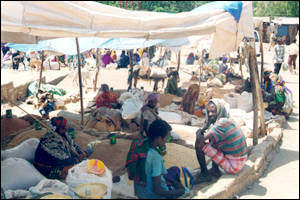 MARKET LIBERALIZATION AND ITS EFFECTS ON THE COFFEE SUB-SECTOR MARKET LIBERALIZATION AND ITS EFFECTS ON THE COFFEE SUB-SECTOR |
->Coffee Ceremony
 1. License issuance fee reduction 1. License issuance fee reduction |
In order to encourage and promote private sector participation in the coffee sub-sector license issuance fees were reduced in 1993. Due to this the number and share market participants has largely increased. At present there are about 6900 coffee collectors, 1580 coffee suppliers and around 200 exporters. In the 1989/90 the number of these market agents were 195, 13 and 14 respectively. As the number of these private market participants is increasing, their share in coffee supply, is also increasing, compared to the state owned enterprise.
 2. Issurance of Licenses for washing stations 2. Issurance of Licenses for washing stations |
Before the liberalization washing stations were exclusively owned by cooperatives and the state owned enterprise (CPDE). Now, private investors are allowed to establish washing stations which helped the farmer to sale his coffee based on competitive price. There are about 380 coffee washing stations of various capacity throughout the country, out of which 194 belonged to individual owners, while the rest are owned by cooperatives. Due to vast participation of this private sector, washed coffee arrival is expected to grow on a large scale.
 3. Producer price adjustment 3. Producer price adjustment |
The Ethiopian government has adjusted the exchange rate of the Birr which has been over valued for years. corresponding to this exchange rate adjustment the government has initially set a minimum producers price for the various types of coffee. In line with the market liberalization this was abolished in 1994. Coffee price nowadays, is very much higher than the minimum and the market is cleared based on the agreement of the buyer and seller. Hence coffee farmers are now earning a good sum of money which in turn encourages them to cultivate and improve coffee both in quantity and quality.
 4. Regionalization 4. Regionalization |
The constitution of the country has established National Regional governmnents. In order to implement the country's development strategy all rural projects are handed over to these national governments. Thus, the transfer of the on going coffee improvement project (CIP) to the respective regions has helped to increase the level of involvement of the farmer in project implementation. Following the establishment of Regional self government, extension agents have been transferred to their respective localities. This reorganization with the additional recruitment of extension agents generated an increased staff, which increased DA farmer ration. Hence the level of contact of extension agents with the adopters of the technology has largely expanded.
 5. Private Investment 5. Private Investment |
During the Previous regime private investors were legally prohibited from owning large scale farms. After the liberalization, private investors either individually or in partnership are allowed and encouraged to participate in commercial coffee farming activities with the appropriate investment incentives that would permit them recover an adequate return.
|  Effects of Liberalization Policy Effects of Liberalization Policy |
As indicated above the number of market participants has drastically increased due to the reduction of license issuance fees and other liberalization measures. Not only their number but the share of these private market participants is increasing both in delivering coffee towards the central market and exporting to the world market.

Coffee arrival towards the central markets was on the average around 80,000 tons before the liberalization policy. After the implementation of the policy however, coffee supply is consistently increasing. In the fiscal year 1996/97 coffee delivered to the auction reached a peak of 165 536, private suppliers contributing 93 percent share out of the total. Even this year, coffee supply has reached 155 377 tons and the share of the private sector is growing to 95 percent.
The conducive environment created by the liberalization policy has facilitated our export performance also. Today, the country's coffee export has reached a peak of 121 366 tons which has never been achieved in our history of coffee export.
The coffee farmer besides benefiting directly from the liberalization policy through an increase in income, is also a beneficiary through earnings in foreign exchange. In the fiscal year 1997/98 Ethiopia has earned 410.8 million USD in foreign exchange from its coffee export.
In the coming years the policy of the government will concentrate on further streghthening the free market economic system. Farmers initiated by competitive prices are expected to fetch a fair share of FOB prices. Hence new planting of coffee will expand together with an increase in yield, which will in turn be simultaneously followed by an increase in production. Assuming all other things normal, an increase in coffee supply and export is expected to be a natural course as the environment is highly attractive to both producers and market participants. The Ethiopian government strives to improve quality through an intensive extension work and cup-testing procedure together with an expansion of the coffee plantation. Washed coffee sill be awarded a prime importance to this endeavor. |

